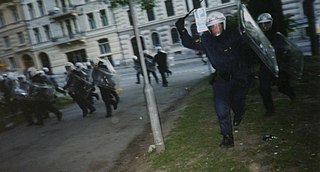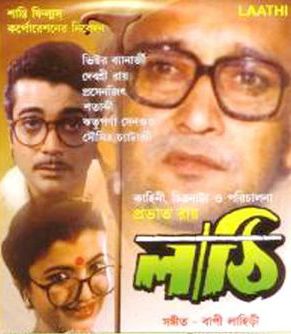
The Bengali language movement was a political movement in East Bengal in 1952, advocating the recognition of the Bengali language as a co-lingua franca of the then-Dominion of Pakistan to allow its use in government affairs, the continuation of its use as a medium of education, its use in media, currency and stamps, and to maintain its writing in the Bengali alphabet / Bengali script

Jamalpur is a district in Bangladesh, part of the Mymensingh Division. It was established in 1978. It has its headquarters in Jamalpur.

Lathi khela is a traditional Bengali martial art – a kind of stick fighting practiced in Bangladesh. A practitioner is known as a lathial. Lathi khela originated from the Bengal region in Indian subcontinent.

The culture of Bangladesh is intertwined with the culture of the Bengal region of the Indian subcontinent. It has evolved over the centuries and encompasses the cultural diversity of several social groups of Bangladesh. The Bengal Renaissance of the 18th early 19th centuries, noted Bengali writers, saints, authors, scientists, researchers, thinkers, music composers, painters, film-makers have played a significant role in the development of Bengali culture. The culture of Bangladesh is deeply intertwined with the culture of the Bengal region. Basically, Bengali culture refers to the culture of Bangladesh. The Bengal Renaissance contained the seeds of a nascent political Indian nationalism which was the precursor in many ways to modern Indian artistic cultural expression.

A baton charge is a coordinated tactic for dispersing crowds of people, usually used by police, paramilitary or military in response to public disorder. In the Indian subcontinent, a long bamboo stick, called lathi in Hindi, Nepali and Urdu, is used for crowd control, and the expression lathi charge commonly employed to describe the action.

Bengalis, also rendered as endonym Bangalee, are an Indo-Aryan ethnolinguistic group originating from and culturally affiliated with the Bengal region of South Asia. The population is divided between the sovereign country Bangladesh and the Indian regions of West Bengal, Tripura, Barak Valley, Goalpara, Andaman and Nicobar Islands, and parts of Meghalaya, Manipur and Jharkhand. Most speak Bengali, a language from the Indo-Aryan language family. Sub-section 2 of Article 6 of the Constitution of Bangladesh states, "The people of Bangladesh shall be known as Bengalis as a nation and as Bangladeshis as citizens."

Anti-Hindu sentiment, sometimes also referred to as Hinduphobia, is a negative perception, sentiment or actions against the practitioners or religion of Hinduism. It exists in many contexts in many countries, often due to historical conflict. There is also scholarly debate on what constitutes Hinduphobia in the Western World.

The culture of Bengal defines the cultural heritage of the Bengali people native to eastern regions of the Indian subcontinent, mainly what is today Bangladesh and the Indian states of West Bengal and Tripura, where they form the dominant ethnolinguistic group and the Bengali language is the official and primary language. Bengal has a recorded history of 1,400 years. After the partition, Bangladeshi culture became distinct from the mainstream Bengali culture, thus their culture evolved differently, still there are many commonalities in Bangladeshi culture & West Bengali culture which connects them both together as Bengali culture.

Shola Aur Shabnam is a 1992 Indian Hindi-language action romantic comedy film directed and edited by David Dhawan and written by Anees Bazmee, Rajeev Kaul and Praful Parekh. It stars Govinda, Divya Bharti, with Gulshan Grover, Mohnish Behl, Aloknath, Bindu, Anupam Kher. The film revolves around the travails of a NCC student Karan (Govinda).

Sursinhji Takhtasinhji Gohil, popularly known by his pen name, Kalapi was a Gujarati poet and the Thakor (prince) of Lathi state in Gujarat. He is mostly known for his poems depicting his own pathos.

A baton is a roughly cylindrical club made of wood, rubber, plastic, or metal. It is carried as a compliance tool and defensive weapon by law-enforcement officers, correctional staff, security guards and military personnel. The name baton comes from the French bâton (stick), derived from Old French Baston, from Latin bastum.

The Gulabi Gang is a female vigilante group in India. Sampat Pal Devi started the group in 2006 in Banda District, Uttar Pradesh. The group is dedicated to empowering women of all castes and protecting them from domestic violence, sexual violence, and oppression. They also combat political corruption and the oppression of lower caste people, specifically Dalits.

The Bengali Language Movement of Barak Valley was a protest against the decision of the Government of Assam to make Assamese the state's sole official language, even though most Barak Valley residents speak Bengali. About 80% of the valley's residents are ethnic Bengalis, and the Bengali population in the Barak Valley region consists of both Hindus and Muslims in about equal number, constituting the overwhelming majority of the population. There is also a substantial minority of native tribes and immigrants from other parts of India.
Zindabad is a word of Persian origin used as a shout of encouragement or as a cheer, and literally means 'Long live [idea or person]'. It is often used as a political slogan, to praise a country, movement, or leader.
Bangladesh is home to various traditional martial arts of which Boli Khela and Lathi Khela are popular and historically significant. Other martial arts are mainly hybrids.

Lathi (transl. Stick) is a 1996 Indian Bengali-language drama film written and directed by Prabhat Roy. Produced by Shanti Film Corporation, it stars Victor Banerjee as the protagonist, with an ensemble cast consisting of Soumitra Chatterjee, Prosenjit Chatterjee, Debashree Roy, Satabdi Roy, Haradhan Bandopadhyay, Abhishek Chatterjee, Pallavi Chatterjee, Rituparna Sengupta, Deepankar De, Tota Roy Chowdhury, Sabyasachi Chakrabarty and Kaushik Sen. The music of the film has been composed by Bappi Lahiri.

Bengali traditional games are traditional games that are played in rural parts of the historical region of Bengal. These games are typically played outside with limited resources. Many games have similarities to other traditional South Asian games.

The lathi is a bamboo stick used by the police in India, Pakistan, Bangladesh, Nepal and Sri Lanka. It has been used in mainland Indian subcontinent since the Mughal Empire, though its use against protesters during the British Raj and since is what the lathi is commonly associated with today.















